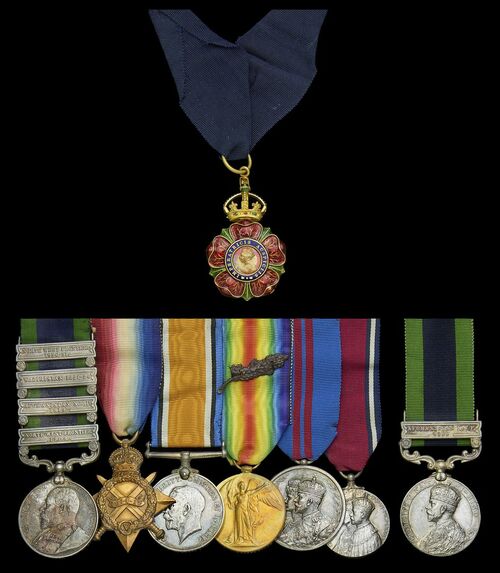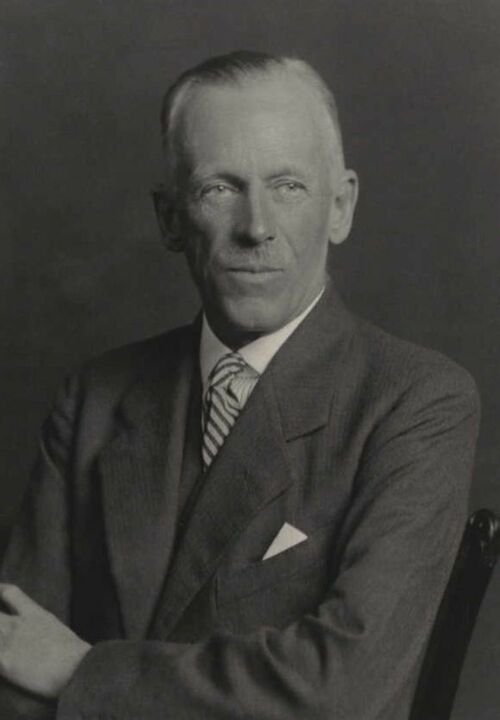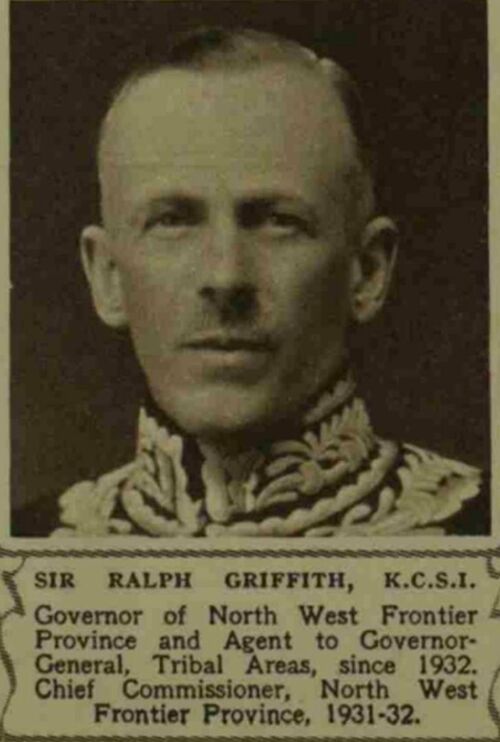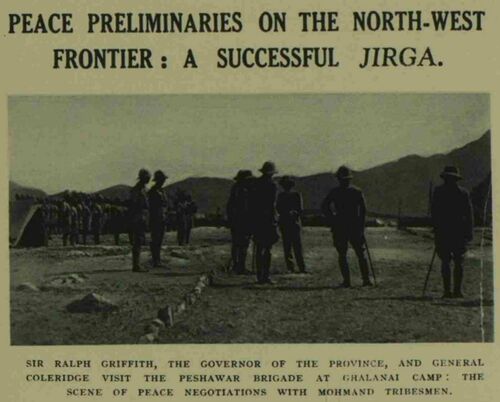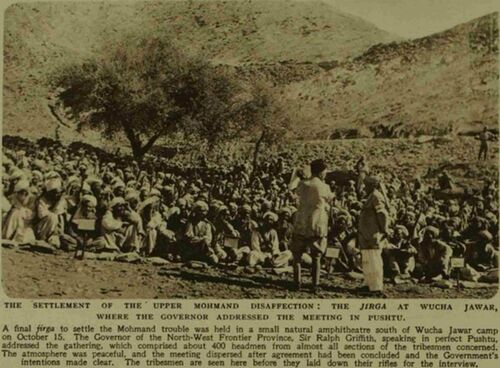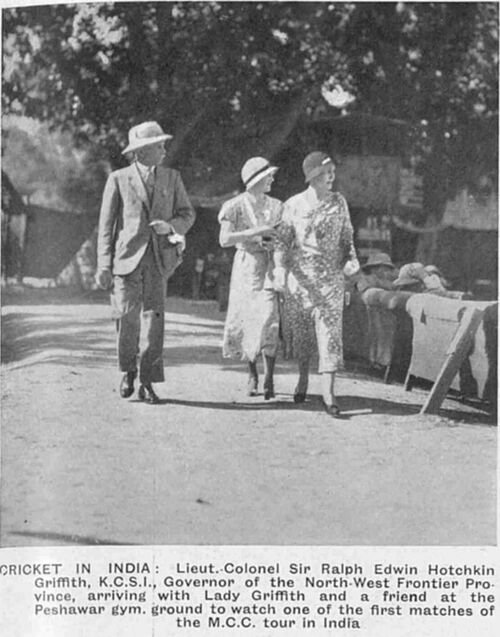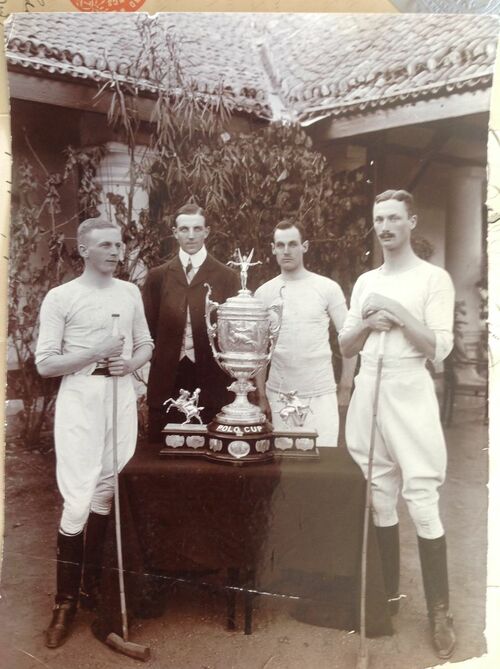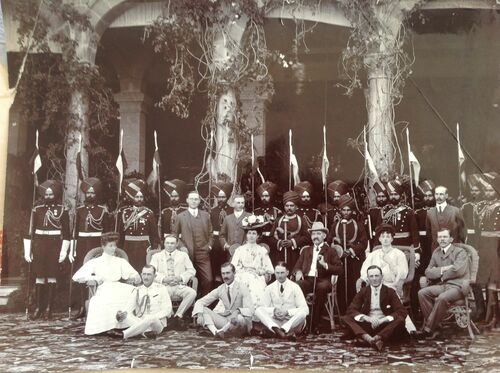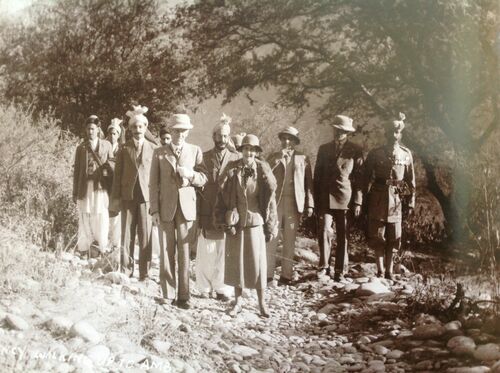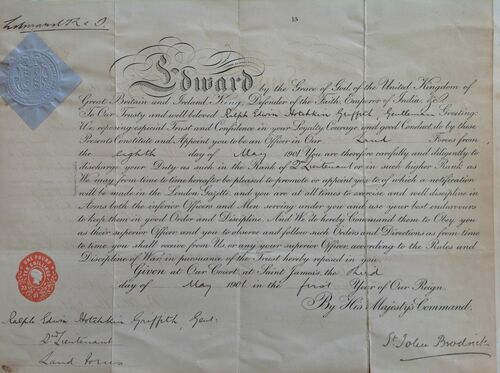Auction: 24001 - Orders, Decorations and Medals
Lot: 259
Sold by Order of a Direct Descendant
The remarkable C.E.I. group of seven awarded to Lieutenant-Colonel R. E. H. Griffith, K.C.S.I., Political Department, late 26th Light Cavalry, the last Chief Commissioner and first Governor of the North-West Provence
The Most Eminent Order of the Indian Empire, C.I.E., Companion’s neck Badge, gold and enamel, in its Garrard & Co. case of issue; India General Service 1908-35, 4 clasps, North West Frontier 1908, Afghanistan N.W.F. 1919, Waziristan 1921-24, North West Frontier 1930-31 (Lieut. R. E. H. Griffith. 26th (K.G.O.) Lt. Cavry:); 1914-15 Star (Maj. R. E. H. Griffith, C.I.E. Poll. Dept.); British War Medal 1914-20 (Major R. E. H. Griffith.); Victory Medal 1914-19, with M.I.D. oak leaves (Maj. R. E. H. Griffith. 19 Pjbs.); Delhi Durbar 1911, unnamed as issued; Jubilee 1935, the campaign awards mounted as worn and sold together with a rare double-issue, India General Service 1908-35, 1 clasp, Afghanistan N.W.F. 1919 (Maj. R. E. H. Griffith, I.A.), named in the British style, overall good very fine (7)
[K.C.S.I.] London Gazette 19 April 1932.
C.I.E. London Gazette 1 January 1917.
Ralph Edwin Hotchkin Griffith was born at Kotagiri, Tamil Nadu on 4 March 1882, the son of Francis and Henrietta Griffith of 'Corsley', Kotagiri. His father was a civil engineer working for the East India Company in the Madras Presidency. Educated first at Blundell's School he joined the Royal Military College, Sandhurst and was commissioned 2nd Lieutenant with the Middlesex Regiment on 8 May 1901. Certified as a speaker of Pashto in November 1902 Griffith was advanced Lieutenant on 11 March 1903 and transferred to the 26th (King George's Own) Light Cavalry in April of that year.
Appointed Squadron Officer and Officiating Adjutant at the same time he was still serving with this unit when he took part in the Mohmand Expedition in 1908. It was later that year that Griffith was first to undertake political work, receiving an appointment on 19 November 1908 as Political Assistant 3rd Class on the North West Frontier. Remaining in political employ he was advanced Captain on 8 May 1910 later becoming Assistant Commissar. Appointed a Magistrate of Peshawar in 1911 he later held the position of Commandant of the British Military Police in Peshawar by 1 January 1912.
The Great War
Griffith was still in India on the outbreak of the Great War, holding the important position of Assistant Political Agent in the tumultuous Mohmand District, the same area he first saw action with the 25th Light Cavalry. Appointed Major without pay while acting on 'political employ' there on 8 May 1916 he served with distinction at what was an extremely difficult period.
British and Indian troops under Major-General Campbell were stretched thinly with the war taking up so much manpower moreover the conditions on the frontier were severe especially during 1916. It was at this time that Major-General Campbell 'mentioned' Griffith in his dispatch of 4 July 1916 for 'valuable assistance given to military commanders throughout the operations'.
His award of the C.I.E. the next year was in connection with the settlement of the Mohmands along with an appointment to Charsadda District as Assistant Commissioner in March 1917. The end of the war saw him at Mardan District and from there Tochi District, as Political Agent from May 1920.
Political Department
With the end of the war Griffith was posted to the Supernumerary List, having completed ten years in civilian employ. He continued in political service with several appointments on the North-West Frontier including Deputy Commissioner at Kohat and later secretary to the Chief Commissioner in Peshawar.
Attaining the rank of Deputy Commissioner Griffith served in that role for four years before stepping into the role of Resident of Waziristan in 1929. He was still serving in that role when the disturbances amongst the Afridi tribes began in 1930 and distinguished himself in his handling of the complex political situation that prevailed on the frontier for the next two years.
However the sudden death of Sir Steuart Pears saw him pulled away from the immediate frontier and appointed Chief Commissioner in 1931. His handling of the district was notable for its peaceable and open-minded approach however it should be noted however that he was not above the use of force where needed:
'The Upper Mohmand invasion of Halamazai territory intensified the magnitude of the problem. Consequently, the Viceroy, Lord Willingdon, approved a request from the Chief Commissioner R. Griffith of the North West Frontier to honour the Government's previous promise to protect the Halamazai.' Taming the Tiger: the Story of the India General Service Medal 1908-35, refers.
A letter written to the Civil & Military Gazette (Lahore) upon Griffith's elevation to Governor gives us some clue as to his conduct throughout his time on the frontier:
'During his stay on the Frontier working in various capacities and doing an immense amount of work, he has earned a name for himself by his integrity, independence and extraordinary ability. He also earned golden opinions both as a political and an executive officer.
Everywhere, his urbanity, tact, and sympathy, his determination to see things for himself, and to learn facts at first-hand, have made him one of the most popular and wide-awake Administrators of his time.
Moreover he is an admitted scholar of many languages and especially of Pushtu and it goes without saying that his intimate knowledge and acquaintance with the Frontier and its people and intricate problems, combined with his useful knowledge of its language, will prove undoubtably of the greatest services to him in his present august and responsible post as first constitutional Governor of N.W. F. Province.
Governor of the North West Frontier Province
The announcement that Griffith was to be appointed Governor was greeted with joy in a number of circles including the local leadership, one newspaper reported that over one hundred Mohmad leaders gathered in Peshawar to give their congratulations to the new governor designate. However, that did not change the constantly dangerous atmosphere of the Frontier and in April a bomb was planted on the Peshawar railway line, coinciding with a visit from Viceroy, Lord Willington. The reason for his visit was to inaugurate Griffith to his new post in person, in a lavish ceremony capped by a 17-gun salute on 18 April 1932.
Griffith's tenure was notable for its peace however he still faced many trials, one of which was the great fire which gripped Peshawar in June 1935. He was at Nathia Gali when the fire broke out and yet despite the danger the Governor immediately set out with a small escort by car over one of the most dangerous roads in the world. An article written by 'An Ex-Red Shirt.' In the Civil & Military Gazette (Lahore) notes that Griffith had covered 150 miles in 5 hours 'at great risk of life in his anxiety to reach Peshawar and personally look after his stricken people'.
That same year heightened tensions saw an increase in military activities on the frontier. After heavy fighting Griffith and Sir Kenneth Wigram accepted peace talks with the Mohmad tribes with the Governor favouring a political and moderated response. As is outlined in The Avoidable War: Pierre Laval and the Politics of Reality, 1935-1936, which states:
'In another act of submission the same day, Malek Halim Khan of Jarobi, spokesman for the Mohmand tribesman, led some 400 tribal headmen before Sir Ralph Griffith, Governor of the Northwest Frontier Province to sue for peace. Sir Ralph's response was delivered in perfect Pushtu, garnished with native proverbs. He left his listeners in no doubt of the British Government's firm determination to build roads and control outlaws. The outlaws were, of course, tribesmen who did not take kindly to British rule and Sir Ralph made the point that the task of regulating them could be delegated to friendlier tribes.'
As Griffith's term was coming to an end in 1936 it became increasingly clear that he could not be spared. A number of petitions and calls were made to both the Viceroy and the Government in London calling for an extension. Notably even the rulers of the frontier themselves publicly supported this action, one letter to the Civil and Military Gazette (Lahore), written by Nawab Habibullah Khan Alizal stating:
'I, too, was in service on the Frontier for 20 years during my father's lifetime. Consequently I am in a position to say that never before in its history did this Province have such a long period of peace and progress as during Sir Ralph's administration.
This is more remarkable in view of the fact that at the time when he assumed the reins of government the whole Province was seething with Red Shirt movement and the relations with the tribes could not be worse. Our prestige, too, was at its lowest ebb due to the Afridi attack on Peshawar Valley. Sir Ralph handled the situation with great tact and masterly ability, and stamped out the subversive movement not only with a firm hand but by exerting his personal charm and great influence with the people of the Province. The movement was killed not by repression but by the marshalling of the law-abiding element of the population on the side of the Government. Peace was restored without leaving an trail of rancour and bitterness.
In the present stage of our development, it is essential to keep him as long as possible in this Province, in order to see us safely through the difficult years lying ahead. I have every hope that H.E. the Viceroy and the Home Government will not disregard our wishes in a matter so vital to our welfare, for however good their choice of a successor may be, it is impossible to replace Sir Ralph Griffith at this critical juncture in the Province.'
This outpouring of support resulted in another year from Griffith, however he was in poor health and was soon forced to quit the post. His replacement Sir George Cunningham, Indian Civil Service, was inaugurated in March 1937.
After his official retirement on 23 July 1937 he settled at The Old House, Livermere, Thingoe, Suffolk. His record as Governor is best seen as that of a progressive and moderniser, attempting to ensure a stronger economy and greater connectivity between the tribes. This attitude as much as the desire to preserve peace in the region earned him plaudits from both friend and foe alike. He died on 11 December 1963; sold together with copied London Gazette extracts, newspaper extracts and census data as well as army lists.
Subject to 20% VAT on Buyer’s Premium. For more information please view Terms and Conditions for Buyers.
Sold for
£2,700
Starting price
£1200

